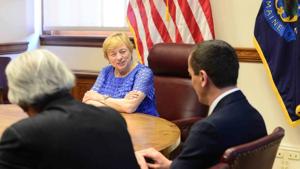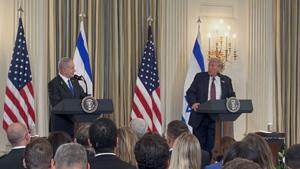
Bipartisan group of lawmakers aim to increase migrant physician jobs
A bipartisan group of Congressional lawmakers wants to expand a program that allows noncitizens to fill physician vacancies in rural areas of the United States that are experiencing shortages.
The Conrad 30 program provides waivers to foreign medical graduates with educational visas so they can stay in the United States and serve as medical professionals in underserved areas. Typically, foreign medical graduates must return to their home countries to practice medicine after studying in the United States.
The program is administered through different agencies in each state and admits 30 graduates in each state per year. The states place the foreign medical graduates in medically underserved areas for a minimum three year contract.
The bipartisan bill aims to expand the amount of graduates each state can admit per year based on how many waivers get approved in that state in the year before.
U.S. Reps. David Valadao, R-Calif., Brad Schneider, D-Colo., Don Bacon, R-Neb., and Mike Garcia, D-Calif., cosponsored the bipartisan legislation.
“Programs like Conrad 30 have been instrumental in helping address this gap by bringing highly trained physicians to the areas that need them most,” Valadao said
The bill would allot 35 waivers to states that use 90% of their waivers from the previous year. The bill also would allow states to get more waivers each year as demand increases.
“Expanding the Conrad 30 visa waiver program is a smart, commonsense step that both parties can support to ensure all Americans have access to quality health care, from doctors they trust, where and when they need it,” Schneider said.
The bill could be seen as a necessary move in states where the Conrad 30 program is widely used and very popular. In fiscal year 2024, 19 states reported filling all slots in the Conrad 30 program, according to data collected by 3RNET, a nonprofit that connects health professionals with jobs in rural areas.
Those states are Arizona, Arkansas, Georgia, Indiana, Connecticut, Kansas, Kentucky, Louisiana, Maine, Massachusetts, Michigan, Minnesota, Missouri, New Mexico, New York, Ohio, Oregon, Pennsylvania and South Carolina. If the bill passes, these states would be eligible for an increase in granted waivers.
In fiscal year 2024, the Conrad 30 program filled 1,010 positions for physicians across the country, according to 3RNET.
The bill also could be popular among voters. A recent poll commissioned by The Center Square found 71% of American voters said it is “very important” to increase legal pathways for immigrants who are doctors and nurses to live and work in the United States.
The American Medical Association and Association of American Medical Colleges also praised the introduction of the bill. The AAMC sent a letter of support for the bill in March.
“With the physician workforce crisis showing no signs of abating, the Conrad 30 program remains an important tool to help ensure patients, particularly in rural and underserved communities, continue to have access to physicians,” said Bruce Scott, president of the American Medical Association.
Latest News Stories

MIT rejects White House education demands

Energy cost concerns loom as legislators look at policy changes

WATCH: Trump touts ‘historic’ ‘Peace Summit’ as world leaders convene in Egypt

PJM exit: A price solution or power move?

U.S. consumers to pay 55% of tariff costs, Goldman Sachs says

JPMorganChase to invest $10B in U.S. firms key to national security

Broadview, Illinois reduces ICE protest zone after ‘chaos,’ 15 arrests

Louisiana: Voting Rights Act ‘balkanizes’ competing racial factions

Illinois’ ‘F’ grade leaves taxpayers on the hook for billions, watchdog says

Democrat Mills to challenge Collins with for U.S. Senate

Some New York school districts spend almost or more than $100,000 a student

Illinois quick hits: Chicago Jewish Alliance on peace developments; Blue Ribbon Schools announced

WATCH: Trump’s emergency Guard appeal denied; Fiscal Fallout reviews state salaries

Trump delivers message of peace, hope during historic Knesset address
